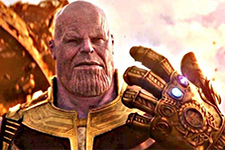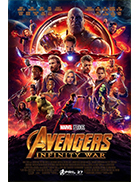Avengers: Infinity War
|  A summer movie event that has literally been a decade in the making, Avengers: Infinity War is the new capstone of Marvel Studios’ ambitious master plan to bring the majority of their comic book heroes to cinematic life—not in separate, stand-alone films, but rather in an intricate web of interlocking narratives, each of which features various plot points and isolated moments (some buried within or after the closing credits) that have laid the groundwork for the events depicted here. From a purely narrative standpoint, it has to be admired for its sheer audacity and sense of assuredness in recreating the kind of intricate, multi-modal, long-form storytelling that comic books have been utilizing for decades; a wrong step at any point could have brought the whole thing down, as we witnessed last summer with Universal’s “Dark Universe” non-starter The Mummy (2017) and, to a lesser extent, rival DC’s fitfully successful, but mostly disappointing attempt to do the same thing with its stable of comic book characters. Nineteen films over 10 years—and while not all of them have been great and a few have even been not that good, as a whole they have maintained a general sense of consistent quality and entertainment value that is impressive in its own right. Avengers: Infinity War, of course, will be most enjoyable for those who have faithfully followed the ups and downs of the “Marvel Cinematic Universe,” although it has enough of its own stand-alone popcorn pleasures to please even those who don’t know (or can’t remember) whether Thor’s brother Loki is an outright villain or a conflicted case of tragically misdirected anger, or how Iron Man’s artificial intelligence computer became its own physical entity, or why there is so much lingering bad blood between Tony Stark and Steve Rogers, or whatever happened to that super-archer played by Jeremy Renner. Basically, all you need to know is that there is a disparate collection of superheroes known as the Avengers that have fought together in two previous movies (2012’s The Avengers and 2015’s Avengers: Age of Ultron) and have since mostly gone their separate ways, but now find themselves faced with their most dangerous nemesis: athe hulking, squared-jawed, purple-skinned interstellar behemoth Thanos (Josh Brolin) who is trying to assemble all of the so-called Infinity Stones, which if ever brought together would give him nearly unlimited power. And what does Thanos want to do with all that power? He wants to wipe out half of all living things in the universe as a means of saving the universe from itself, similar to Ultron’s desire to destroy humankind in the previous Avengers movie. The Ultron plot carried a somewhat more introspective vibe since Ultron was a bastard Frankenstein’s monster of Tony Stark’s own creation, while Thanos is the ultimate external villain, literally emerging from the depths of the cosmos to wreak havoc on all of existence to satisfy his own deranged sense of right and wrong. It is refreshing, in this regard, that he isn’t after something as boring as world (or universe) domination, and the destruction of half of all living things is an intriguing escalation of the typical superhero-movie plot in which the heroes must save the world from certain annhiliation. The stakes are so high this time around that they border on the abstract, and there is a danger there that is compelling. There is, not surprisingly, a lot of familiarity built into the story, which is a constituent part of the MCU’s sense of pleasure—that delicate dance between the new and the old, the surprising and the familiar. We’ve been with some of these characters for a long time now: Billionaire industrialist-playboy-turned-iron-suited-crusader Tony Stark / Iron Man (Robert Downey Jr.) kicked things off in Jon Favreau’s Iron Man back in 2008, followed quickly by films centered around Norse demigod Thor (Chris Hemsworth) and unfrozen super-soldier Steve Rogers / Captain America (Chris Evans). They have already had their ups and down in the previous Avengers movies along with Mark Ruffalo’s Bruce Banner/Hulk, as well as in Captain America: Civil War (2016), which essentially played as a third Avengers entry. However, we haven’t seen them interact to a significant degree with some of the newer characters, including Benedict Cumberbatch’s supernatural Doctor Strange, Tom Holland’s gawky Peter Parker/Spider-Man, and Chadwick Boseman’s African king T’Challa/Black Panther. A number of the secondary characters, such as Anthony Mackie’s Sam Wilson / Falcon, Elizabeth Olsen’s Wanda Maximoff / Scarlet Witch, Don Cheadle’s James Rhodes / War Machine, and Scarlett Johansson Natasha Romanoff / Black Widow also show up, along with the whole cast of The Guardians of the Galaxy, which threatens to push the overstuffed movie to its breaking point. Yet, the script by Christopher Markus and Stephen McFeely (veterans of four previous Marvel movies, including all three Captain America entries) manages to keep everything fairly well balanced, juggling all of the superheroes and their subplots while also giving significant screen time to Brolin’s Thanos, who, as noted earlier, is not your typical super-villain even though he certainly looks and, at times, acts like one. Directors Anthony and Joe Russo, who previously helmed Captain America: The Winter Soldier (2014) and Civil War and therefore are quite familiar with the terrain both narrative and aesthetic, keep the proceedings lively and moving at a brisk clip, which makes the two-and-a-half-hour running time feel relatively brisk. Given that it is already well known that this is the first installment of a two-part narrative, it shouldn’t come as much surprise that the story moves into dark territory, dangling us on a cliff-hanger of an ending that is surprisingly daring in its willingness to see the movie’s central threat to its logical conclusion. There is no doubt that much will be set right in part two, but one of the things that makes Infinity War stand out from its predecessors is the undeniable sense that, at least for some characters (and actors), this is their swan song and that some things must come to an end. Copyright © 2018 James Kendrick Thoughts? E-mail James Kendrick All images copyright © Marvel Studios |
Overall Rating: 

 (3)
(3)


